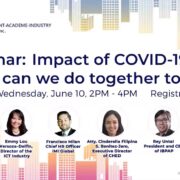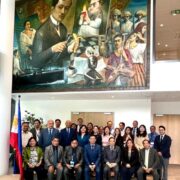
Manila, Philippines — As the country continues to be embattled by the pandemic, key leaders and decision makers recently gathered at the First Government-Academe-Industry Network, Inc. (GAIN) Webinar to address how this will impact the Philippines’ global competitiveness and human capital development.
Since its first National Convention in 2018, GAIN has been successful in sparking conversations both in the public and private sectors when it comes to human capital development in the areas of English proficiency and digital literacy to boost the country’s global competitiveness. Last February, GAIN 2020 focused on equipping the current and future Filipino workforce with the proper knowledge and skill sets needed as the global landscape continues to shift due to tech integration, in accordance to the ASEAN Smart City Framework.
Themed “Impact of COVID-19: What can we do together to adapt?”, the GAIN Webinar shared insights on how the pandemic is impacting different aspects of the country’s global competitiveness. It also spurred a discussion on recommendations on how the government, academe, and industries collaborate and partner to adapt and conquer these challenges.
Moderated by GAIN President and TeamAsia President and Founder Monette Iturralde-Hamlin, the Conference gathered speakers from the government, academe, and industries including Commission on Higher Education (CHED) Executive Director Atty. Cinderella Filipina S. Benitez-Jaro, Department of Information and Communications Technology (DICT) Assistant Secretary Emmanuel Rey R. Caintic, DICT Director for ICT Industry Development Bureau Emmy Lou Versoza-Delfin, Holy Angel University President Dr. Luis Maria R. Calingo, IT and Business Process Association of the Philippines (IBPAP) President and CEO Rey Untal, and Integrated Microelectronic, Inc. (IMI) Global Chief HR Officer Francisco “Paco” Romero Milan.
Academe
Considering the absence of a vaccine, Dr. Calingo shared three things that the academe must prepare for: Possibility of Social Distancing for 2020-2022, On-and-Off COVID-19 Outbreaks and Quarantine Periods, and the Likelihood of an Exclusively Online School Year 2020-2021.
“Quality online education takes a lot of work. We need to dedicate adequate resources to design a completely different kind of course, smaller modular pieces, different types of assessments, technology to monitor how students are picking up, asynchronous delivery of material, flip classrooms, online projection of materials, online interactions and so on,” explained Dr. Calingo. He also mentioned concern on higher tuition fees for Zoom Universities as well as challenges including learning of new teaching strategies to ensure a good learning experience despite social distancing.
Dr. Calingo also shared potential partnerships including:
- For Government and Industry – Accelerate the connectivity of towns and municipalities, especially outside the National Capital Region (NCR).
- For Academe and Industry – Redesign curricula into competency-based education to enable graduates in making a value-adding contribution upon entering the workforce in the new normal.
- For Government and Academe – Schools must leverage their knowledge assets to produce and disseminate knowledge about the pandemic to counteract misinformation on social media.
Government
Speaking on behalf of the government, DICT’s Delfin shared various projects and initiatives of the Department in combating the pandemic and navigating through the new normal including the National Broadband Program, Free WiFi Access in public places and state universities and colleges (SUCs), Tech4ED Centers, Digital Teachers and Leaders, ICT Academy, and Skills Window.
“Through ICT, we can express the Bayanihan spirit in our actions as we crowdsource donations for frontliners and the poor, organize assistive campaigns online, and engage in supportive social media forums. In collaboration with all government agencies, private sector, and academe, we are steadily ramping up our initiatives to be effectively responsive to the rapid changes of the new normal,” said Delfin as she ended her presentation.
CHED’s Atty. Jaro discussed the Commission’s plans for the school year 2020-2021, including the rolling opening of the academic year, implementing a flexible learning system, and faculty and development of open education resources. Some key considerations that they accounted for the decision-making on the opening of classes are: differences between K-12 and Higher Education; implementation of flexible learning; preparedness of Higher Education Institutions (HEIs) for school opening; and, impact of school opening to public and private HEIs.
Atty. Jaro shared, “We will be providing funding assistance on both wired and non-wired flexible learning options, specifically in the areas of curriculum design, learning delivery, assessment of learning outcomes, technology integration, and the development of appropriate educational resources and training of admin and other personnel.” To undertake these, CHED requires assistance on technical support from HEIs and SUCs, a memorandum on proper implementation of the policies employed by the local government, and training for faculty and administration for professional development.
Industry
Representing the Philippine IT and Business Process Management (IT-BPM) industry, IBPAP’s Untal said that while the pandemic was challenging, it also presented learnings as it became a testament to their sector’s resilience. Thanks to various government agencies, they were allowed to quickly mobilize working models that increased productive capacity and effectively support existing businesses.
Untal then discussed the industry’s exit framework for the gradual exit from the ECQ. It outlined scenarios that focused on meeting a set of criteria before easing out, and strategies in transitioning without a vaccine. With work-from-home (WFH) being seen as a viable arrangement, he shared several challenges on infrastructure to extend WFH capabilities and securing approvals from clients due to concerns over information security.
Closing his discussion, Untal said, “We know for a fact that the conversation around resolutioning, rebalancing of accounts, and even the widespread adoption of technologies that weren’t heavily utilized before will be upon us. We are in clear agreement that the path forward relies on our ability to be in front of those conversations because the relevance of our practice and industry in this very competitive global setting relies heavily on that.”
Representing various industries, Milan presented the efforts that IMI Global and the Ayala Group spearheaded amid the pandemic for its employees, partners, and the communities around them including: a hotline for medical concerns, rapid testing protocol before entering the workplace, financial assistance, onsite accommodations and transportation for the skeletal workforce, provision of Personal Protective Equipment (PPEs) and vouchers to families, conversion of the World Trade Center into healthcare facility, and building a COVID-19 testing center in Mandaluyong City.
“In any crisis, coordination, cooperation, and unity of action are key to survive. This is not only crucial to our internal collaboration, but also with the public and private sectors. We in Ayala trust that the collaboration and unity of purpose and action will prioritize the well-being and survival of the Filipino will continue beyond this crisis,” concluded Milan.
GAIN and TeamAsia’s Hamlin closed off the webinar with a question on having one thing to help reboot the economy. Dr. Calingo highlighted the importance of giving businesses and schools the confidence to reopen and create a safe harbor legislation on good faith immunity that would protect businesses and schools from legal liabilities. Untal focused on rethinking the country’s human capital strategy to transform talents into lifelong learners and having the tools needed to mobilize that moving forward.
Atty. Jaro zeroed in on the responsibility to provide a mechanism to continue with an accessible education and asked for everyone’s support, especially DICT when it comes to connectivity and the remedies they would take for schools. DICT Asec. Caintic reiterated the importance of partners keeping an open mind to compromise and the cleaning of regulatory burdens of the Department. Milan cited rethinking the delivery of education to avoid widening the social gap between public and private institutions, efficient public transportation, and improvement of the public health system to help families avoid bankruptcy.
“Talent has always been one of the Philippines’ greatest assets. With the impact of the pandemic, there must be more focus now on further strengthening our human capital strategies. With this GAIN webinar, we are able to put the spotlight on the different government-academe-industry collaborations and partnerships needed to adapt to the new normal, continuously champion our workforce, and maintain our global competitiveness,” concluded Hamlin.
This GAIN Webinar was powered by TeamAsia, an award-winning integrated marketing experiences agency.
—
About the Government-Academe-Industry Network, Inc.
The Government Academe Industry Network, Inc. is a non-profit organization spearheaded by industry leaders to identify and address workforce issues which can be resolved through the collaboration and synergy of the government, academe, and industry.
—
Watch the webinar here.






